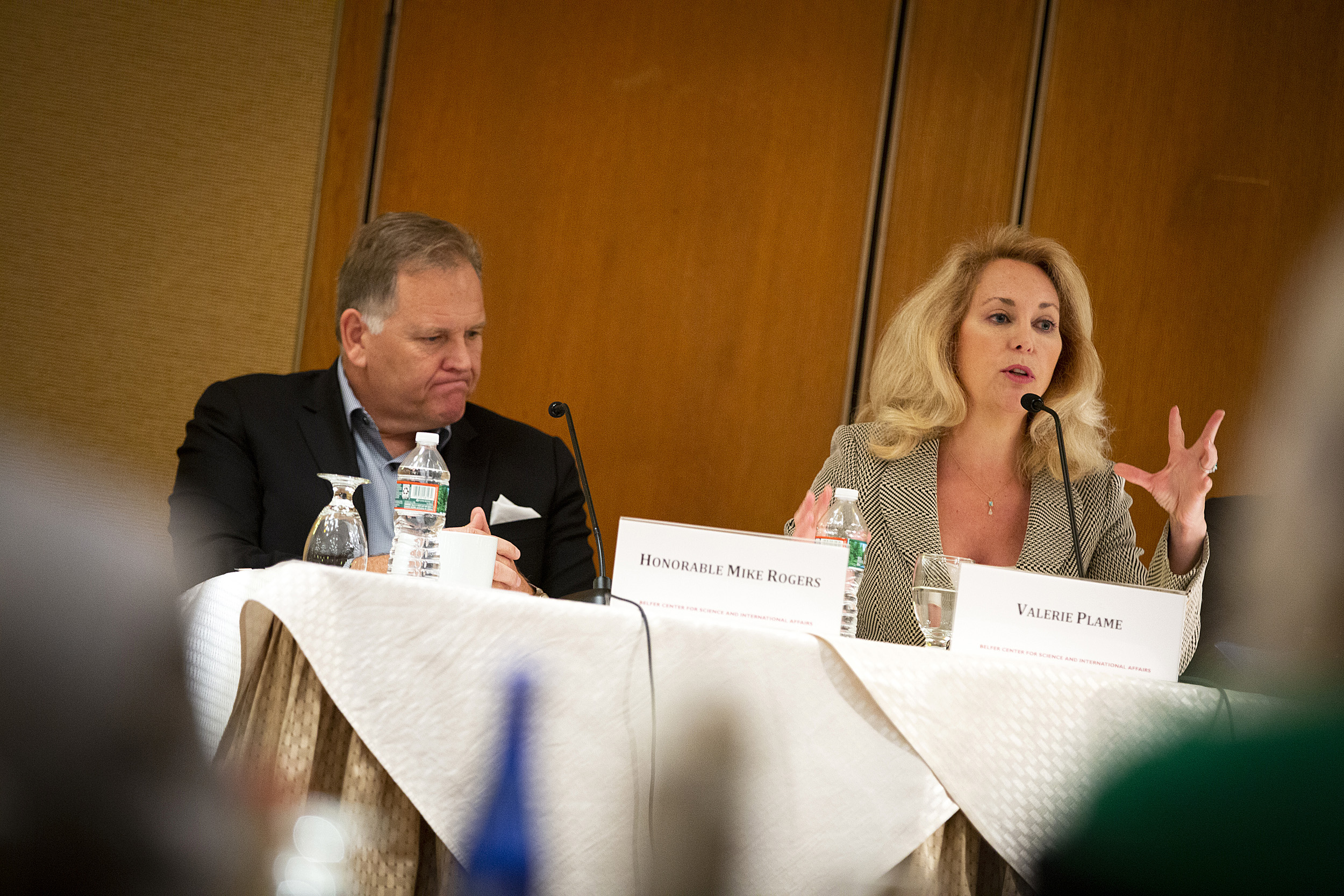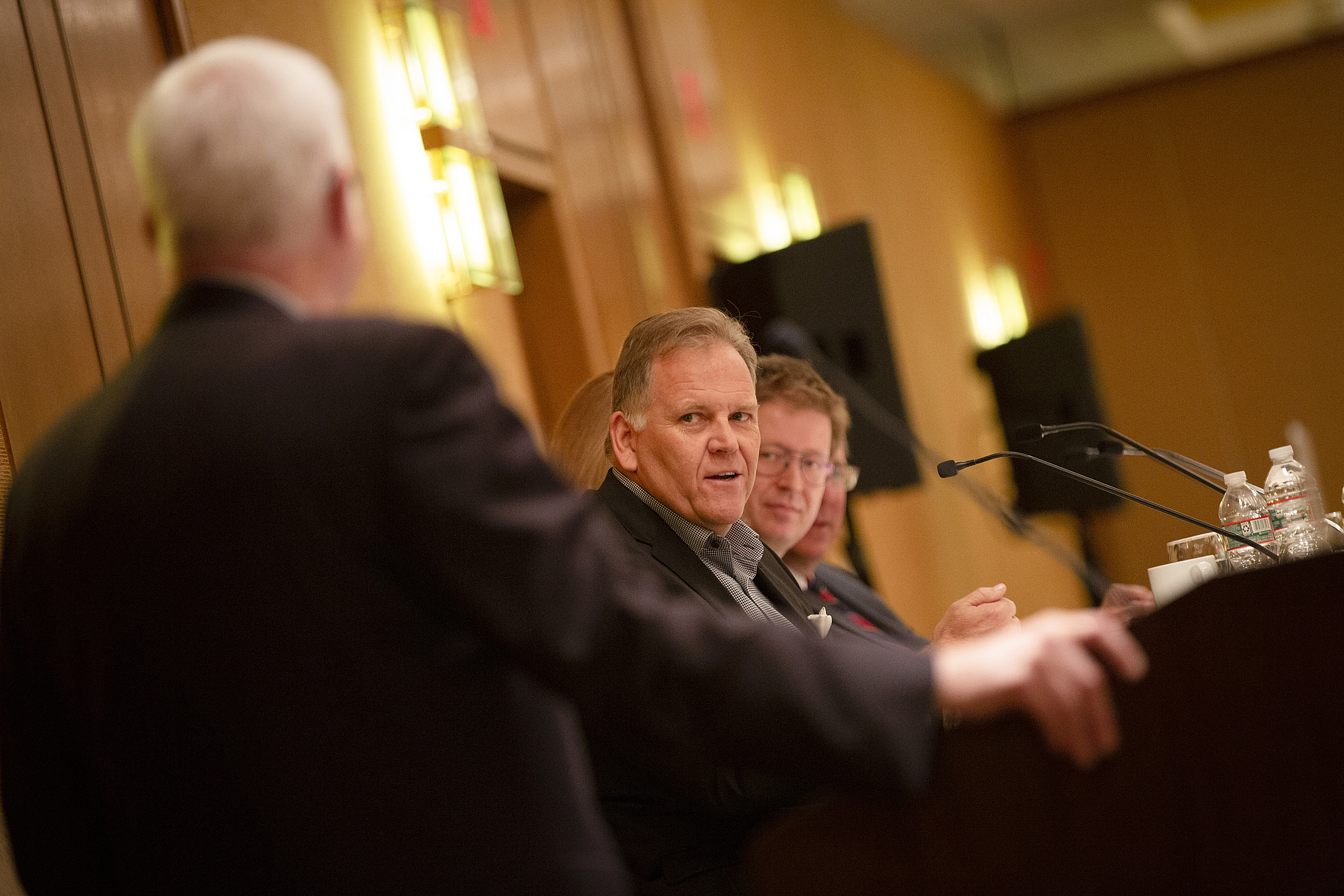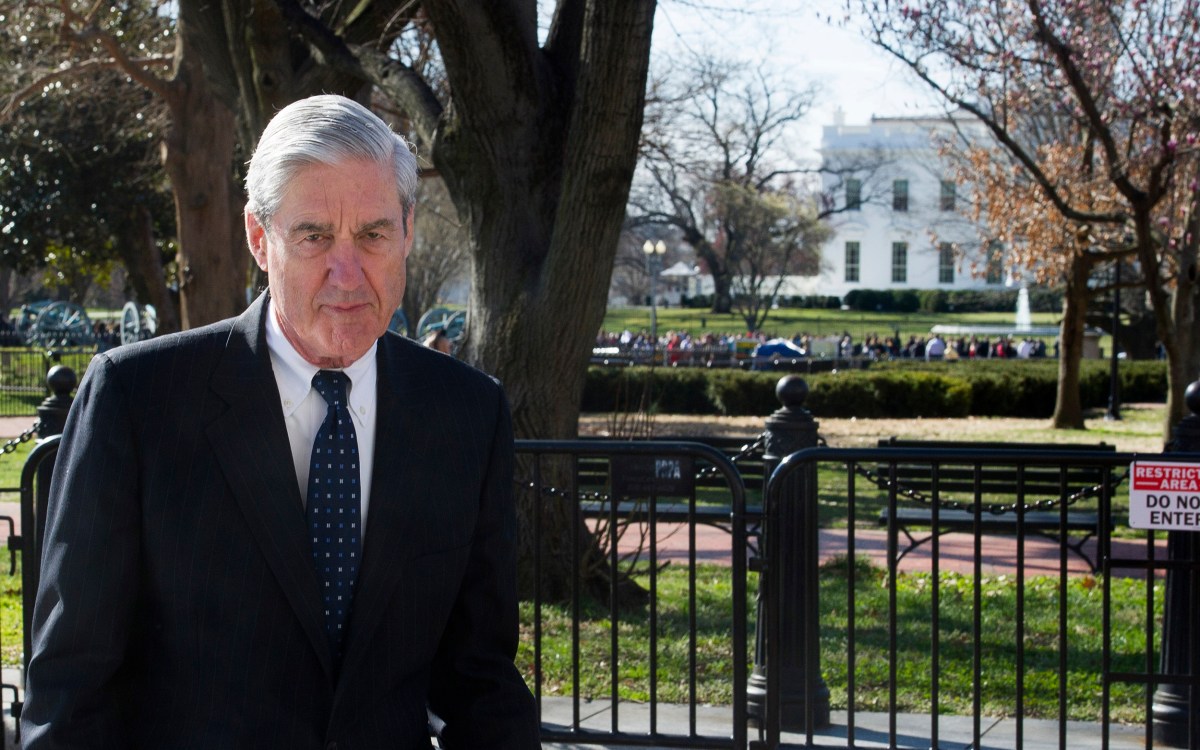
Panelists Mike Rogers (left) and Valerie Plame speak on “the ethics and morality of Intelligence.”
Stephanie Mitchell/Harvard Staff Photographer
Intelligence matters
Former FBI, CIA officers, lawmakers, analysts discuss ethical and moral issues
Intelligence professionals assume great risk to collect valuable information and conduct complex operations around the world in order to protect national security and undergird U.S. foreign policy.
The last thing they should worry about is how their work moves someone’s poll numbers.
But in this era — when both 2016 presidential candidates think former Federal Bureau of Investigation Director James Comey tried to sabotage their campaigns, and the U.S. intelligence community’s boss, President Trump, has dismissed its conclusion that Russia interfered in the election, attacked the probe into his campaign’s ties to Russia led by another former FBI director, Robert Mueller, and called for a federal investigation of retired top officials in the FBI, the Central Intelligence Agency, the National Security Agency, and the Office of the Director of National Intelligence for allegedly “spying” on his campaign — even intelligence work, it seems, has become politicized.
Former intelligence officers, lawmakers, national security analysts, and top journalists discussed some of the ethical and moral issues in intelligence work and looked at the current challenges facing those in the field during a conference this week hosted by the Intelligence Project, a program of the Belfer Center for Science and International Affairs at Harvard Kennedy School (HKS).
In one session, project director Rolf Mowatt-Larssen, a former career CIA officer, asked panelists how politics intersects with intelligence. The group debated whether any intelligence work is ever free from politics, given that agencies work for a head of state who decides what priorities are pursued and what information will be shared with the public, and when.
For Valerie Plame, the politicization of intelligence was something “I experienced quite personally.” Plame, a former covert operations officer working in nuclear counterproliferation, recounted how politics derailed her career at the CIA during the run-up to the Iraq War. Her identity was infamously made public in 2003 by the conservative columnist Robert Novak, with help from senior White House officials, in retaliation for her then-husband Ambassador Joe Wilson’s public criticism of the Bush administration’s push for war.
“I wish the intelligence business was a binary question every time. … Unfortunately, it is almost never a binary decision when you make it.”
Mike Rogers
Her outing, Plame said, began a bewildering time of fear for the safety of her family and her source network and uncertainty fighting the administration in court and in the media.
“Sometimes you’re going to deal with some very unseemly people in the intelligence business” — many of whom have done “some horrific things,” said Mike Rogers, a former Republican Congressman from Michigan who chaired the House Intelligence Committee from 2011 to 2015 and served as an FBI special agent.
For intelligence officers to gather information about a group’s intentions or capabilities, they often have to infiltrate and gain credibility with that group, which likely means engaging in activities “that we would all find morally objectionable,” said Rogers.
In that difficult environment, there are times when practitioners have to make close calls, and they don’t always get it right. “I wish the intelligence business was a binary question every time. … Unfortunately, it is almost never a binary decision when you make it,” he said.
The keys to an ethical intelligence service are making sure officers are disciplined and well-trained in ethics, and ensuring that operations are closely guided by legal counsel and services are subject to regular, rigorous congressional oversight, Rogers said.
David Sanger ’82, a veteran national security correspondent for The New York Times and a Belfer Center fellow and lecturer, said disclosing or publishing classified information is part of the job for reporters on his beat, but added that he uses great care, and the information is often the last piece of a puzzle that was started using open-source material and reporting.
Although all presidents have at times ignored the advice of intelligence advisers, cherry-picked intelligence to publicly justify an unpalatable military action, or pursued an agenda that threatened to upend sensitive, long-planned operations, the clash between Trump and U.S. intelligence agencies is new, he said.


Panelists David Sanger and Mike Rogers debate and discuss the current state of affairs in national intelligence.
Stephanie Mitchell/Harvard Staff Photographer
“What we’ve seen in the past two-and-a-half years has been completely different,” said Sanger. “It has been attacks by the executive branch on various parts of the executive branch for providing information that the president found to be highly politically inconvenient… That is something we haven’t seen before.”
Whether these hostilities are a temporary feature of the current administration or part of a permanent presidential playbook remains to be seen, he added.
Mowatt-Larssen said he sometimes feels queasy when he sees former intelligence colleagues on television discussing national security concerns about the current administration, but he understands their motivation. “They feel obliged to speak out in the name of truth.”
The digital era presents significant challenges with which the intelligence field is still wrestling.
Since the theft of classified U.S. government data by Edward Snowden, Chelsea Manning, and others and its subsequent public disclosure via WikiLeaks, the debate over whether U.S. intelligence is more principled than its counterparts in authoritarian states such as Russia, China, or North Korea has roiled in recent years.
While most of the focus has been on the ethics of the government’s activities, like surveillance of U.S. citizens, those disclosures did “real harm” to U.S. national security, and raised an issue that doesn’t get enough attention, Rogers said: “What about the morality of whistleblowers? They decided their moral obligation was to share it with the world even though they didn’t understand 99 percent of the decisions or the oversight” that went into what was done — or have a window onto how the information they exposed fit into the much bigger national security picture.






